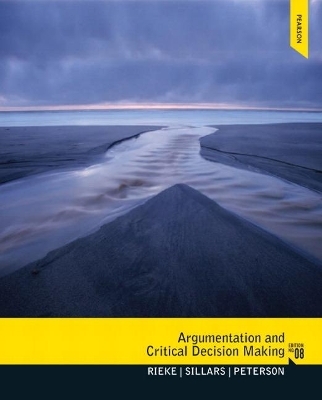
Argumentation and Critical Decision Making
Pearson (Verlag)
978-0-205-21059-6 (ISBN)
Table of Contents
Preface
Part One Principles
Defining Argumentation
Elements of Argumentation
Elements of Critical Decision Making
Conclusion
Projects/Exercises
Appraising Argumentation
Argumentation and Being Reasonable
The Bases of Reason in Argumentation
Starting Points for Argumentation
Conclusion
Projects/Exercises
Making Sense of Argumentation
Some Ways of Making Sense
Alternative Dispute Resolution
Conclusion
Projects/Exercises
The Nature of Arguments
The Model of an Argument
Reasoning Processes
Definitions as Argument
The Analysis of Arguments
Conclusion
Projects/Exercises
Analysis in Argumentation
Critical Analysis to Find a Proposition
Critical Analysis of a Proposition
Analysis of Claims
Conclusion
Projects/Exercises
Case Building
Preliminary Steps in Case Building
Developing a Convincing Vision
Communication to Specific Decision Makers
Conclusion
Projects/Exercises
Part Two Tools
Support: Evidence
Forms of Evidence
General Principles for the Use of Evidence
Sphere Dependence of Evidence
Conclusion
Projects/Exercises
Support: Values
Characteristics of Values
Values Appear in Systems
Values Define Ethics
General Principles for the Use of Values
Sphere Dependence of Values
Conclusion
Projects/Exercises
Support: Credibility
Characteristics of Credibility
Forms of Credibility
General Principles for the Use of Credibility
Sphere Dependence of Credibility
Conclusion
Projects/Exercises
Refutation
The Process of Refutation
Approaching Refutation
Setting a Framework for Refutation
Selecting a Posture for Refutation
Communicating Refutation
Conclusion
Projects/Exercises
Refutation by Fallacy Claims
Views of Fallacy
Social Guides to Fallacy Claims
Using Fallacy Claims in Refutation
Conclusion
Projects/Exercises
Part Three Applications
Argumentation in Law
Narratives in Legal Argumentation
Arguments on the Law
Commonplaces in Legal Argumentation
Conclusion
Projects/Exercises
Argumentation in Science
What is Science?
Scientific Values
The Tradition of Argumentation in Science
Scientific Use of Argument Types
Scientific Use of Evidence
Scientific Method as Argument
Conclusion
Project s/Exercises
Argumentation in Religion
Major Questions in Religious Argumentation
Evidence in Religious Argumentation
Preferred Argument Forms
Conclusion
Projects/Exercises
Argumentation in Business
Starting Points for Business Argumentation
Forms of Support in Business Argumentation
Conclusion
Projects/Exercises
Argumentation in Government and Politics
The Nature of Political Argumentation
Argumentation in Government and Politics
Argumentation in Legislative Action
Argumentation in Political Campaigns
The Special Role of Debates
Refutation in the Political Campaign
Conclusion Projects/Exercises References Name Index Subject Index
| Erscheint lt. Verlag | 14.3.2012 |
|---|---|
| Sprache | englisch |
| Maße | 187 x 232 mm |
| Gewicht | 460 g |
| Themenwelt | Kunst / Musik / Theater ► Theater / Ballett |
| Schulbuch / Wörterbuch | |
| Geisteswissenschaften ► Philosophie ► Logik | |
| Sozialwissenschaften ► Kommunikation / Medien ► Kommunikationswissenschaft | |
| ISBN-10 | 0-205-21059-7 / 0205210597 |
| ISBN-13 | 978-0-205-21059-6 / 9780205210596 |
| Zustand | Neuware |
| Haben Sie eine Frage zum Produkt? |
aus dem Bereich


